Stay in the know on all smart updates of your favorite topics.
People get more connected and technology becomes part of our daily life. Between 2014 and 2015 there was a 27% growth of internet traffic in Amsterdam. Eleven out of fifteen Trans-Atlantic data cables are connected with or go through Amsterdam and the AMS-IX is the second largest internet exchange point in the world. In 2016 Amsterdam was ranked second in the European Digital City Index. Do you work on a smarter city? Share your technologies here!
Amsterdam Smart City and City of Amsterdam launch the Amsterdam Innovation Tour

The app is designed to help international delegates and local city users experience some of Amsterdam’s innovative approaches and solutions for smart and sustainable urban development.
Amsterdam Smart City and City of Amsterdam launch the Amsterdam Innovation Tour
During We Make The.City innovation festival, Amsterdam Smart City and the City of Amsterdam released an app-based self-guided innovation tour which is now available from the Apple Store and Google Play. It was officially launched by Touria Melia, Amsterdam’s Vice-Mayor of Culture, Art and ICT, during the Next Generation Cities conference on 21 June.
The app is designed to help international delegates and local city users experience some of Amsterdam’s innovative approaches and solutions for smart and sustainable urban development.
There are two routes to choose from, starting from Central Station. Users start the tour by activating a special message on a JCDecaux digital screen.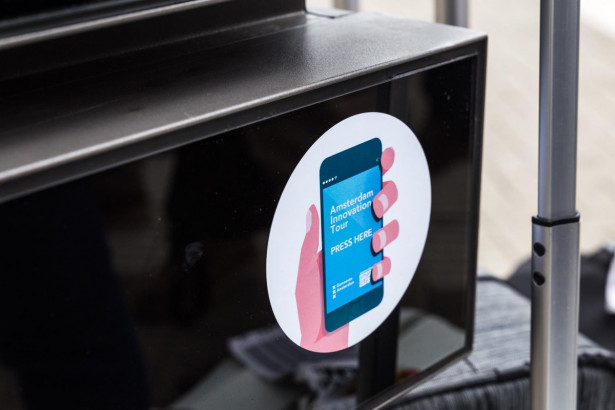
start button on JCDecaux MUPI ©Jurre Rompa
The first route “Culture of innovation” takes users along a two-kilometer walk along Oosterdokseiland development to Marineterrein, the former navy based that is being converted to innovation district. The second route, “Transformational innovations” leads users though Amsterdam North to De Ceuvel living lab and finishes at NDSM-wharf.
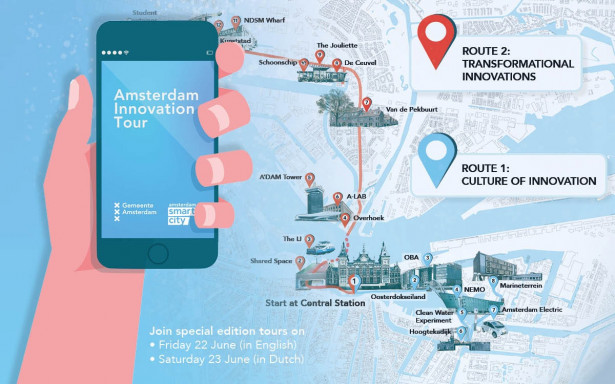
On 22 June, a special-edition walking tour was organized where stakeholders and WMTC participants tested the app while walking the “Culture of innovation” route from Central Station to Marineterrein with several experts sharing their innovative projects along the way. László Vákár of Movares explained the innovative characteristics of the new 300-meter long bus canopy on the North-side of Central Station, which through its clever design decouples rainwater from the sewage system. See also <https://movares.nl/nieuws/overkapping-ijsei-wint-publieksprijs-vernufteling/>.
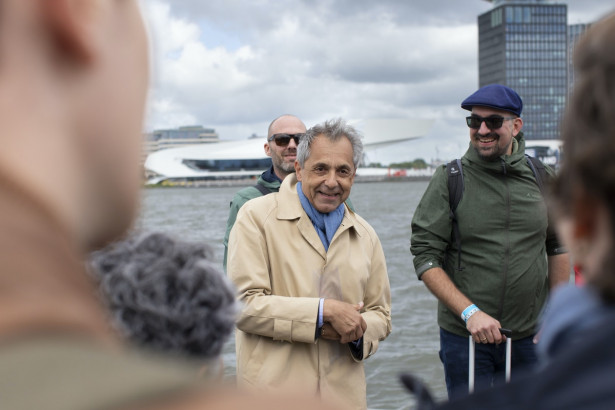
László Vákár ©Thomas Schlijper
Eelco Thiellier of the city of Amsterdam shared several examples of how the city is becoming a smart city through the use of the CMSA (Crowd Monitoring System Amsterdam) that uses sensors which collect anonymized data about pedestrian movements at hotspots. Collection is done at big events e.g. Sail or at the Arena boulevard or in permanent situations like the red light district, the Kalverstraat, the ferry terminal and at OV-hubs. This data is used to generate insight in crowdedness in order to introduce pedestrian friendly measures to keep the city accessible, safe and comfortable. See also www.amsterdam.nl/crowdmanagement.
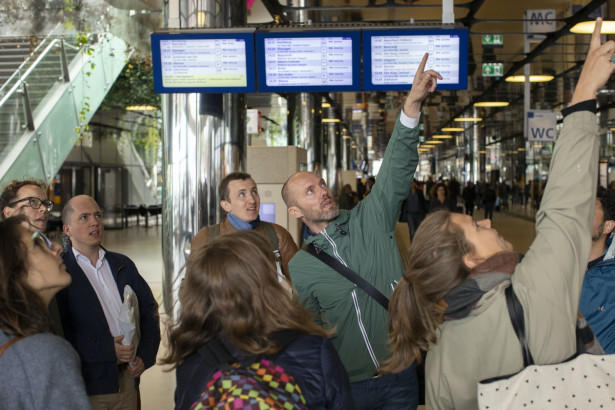 Eelco Thiellier ©Thomas Schlijper
Eelco Thiellier ©Thomas Schlijper
Judith van Laarhoven of Amsterdam Electric shared insights about the city’s ambitious program to further electrify transport. With already 2,800 electric vehicle charging stations, the City is working towards clean / emissions-free transport by 2025. See also <https://www.amsterdam.nl/parkeren-verkeer/amsterdam-elektrisch/>.
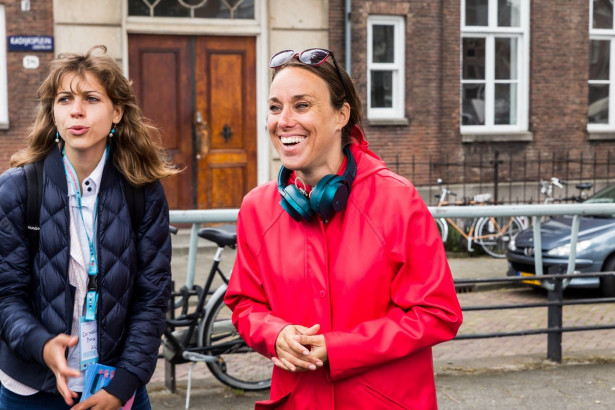
Judith Laarhoven ©Jurre Rompa
Another highlight of the tour was the use of the JCDecaux’s digital screen (also known as MUPI) to activate a special welcome message in front of Central Station. Stakeholders and visitors were enthusiastic about the possibility to use this digital infrastructure to deliver location-specific information at other points in the tour.
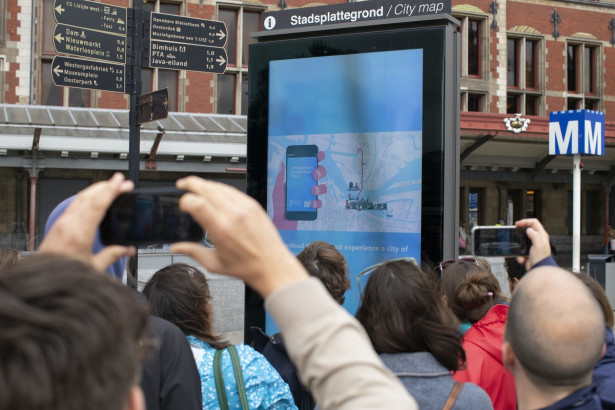
Start of the tour on the digital screen ©Thomas Schlijper
We are now collecting feedback on the app which will help us improve the next version, which will also feature AR capabilities. Do you have an innovation you think should be included in one of the two existing routes or do you have a suggestion for a separate route? We invite professionals, researchers, citizens and visitors to share your ideas below or via <a>innovationtour@amsterdamsmartcity.com</a>.
Amsterdam Innovation Tour app preview
Click here to download the app from the Apple Store and Google Play.
Top 20 Civic Tech Websites for Urban Planners and City Makers
The Global Grid has published its ranking of the top 20 civic tech websites for urban planners and city makers. The list features the five most visited platforms in four categories: open data, crowd-sourcing, community engagement and public service.
Check the selection and let us know which websites and online tools, on the list or others, you think are most useful for urban development and governance.
Dutch Data Science Week - De impact van data science op de maatschappij

The second edition of the Dutch Data Science Week is looking for concrete solutions for societal challenges.
Van het verminderen van onnodig energieverbruik tot het bedenken van een samenhangend systeem voor kunstmatige intelligentie in een ziekenhuis: tijdens de Dutch Data Science Week ontwikkelen data scientists slimme oplossingen voor maatschappelijke uitdagingen. De tweede editie vindt plaats van 25 mei tot en met 1 juni.
De Dutch Data Science Week (DDSW) is een initiatief van GoDataDriven en SAS en heeft dit jaar ‘the impact of data science on society’ als thema en wil aan de hand van maatschappelijke uitdagingen een impuls geven aan de kennisontwikkeling en kennisdeling binnen data science. Centraal tijdens de week staan de hackathons waar data scientist concrete oplossingen bedenken voor uitdagingen op het gebied van duurzaamheid, gezondheid en samenleving.
“De waarde van data komt pas tot uiting in een concrete toepassing”, zegt DDSW-organisator Walter van der Scheer. “Binnen DDSW stellen we data scientists in staat om hun kennis in te zetten voor een maatschappelijk doel. Uiteindelijk is het onze ambitie om aan het einde van de week met de inzet van data écht iets bijgedragen te hebben aan maatschappelijke verbeteringen.”
Energie besparen
Energieleveranciers Eneco organiseert een hackathon. “We willen het voor onze klanten zo makkelijk mogelijk maken om duurzaam met energie om te springen. Data is hiervoor een belangrijke sleutel. Tijdens DDSW krijgen data scientists de mogelijkheid om met behulp van data unieke slimme toepassingen te ontwikkelen die bijdragen aan het verminderen van onnodig energieverbruik”, zegt Ronald Root, Senior Data Driven Business Developer & Privacy Officer bij Eneco.
Datagedreven ziekenhuizen
Ook het Universitair Medisch Centrum Groningen organiseert een hackathon.
Pim van der Harst, hoogleraar Interventie en translationele cardiologie: “We staan op de drempel van datagedreven gezondheidszorg. Je ziet steeds meer specifieke toepassingen voor de organisatie, diagnostiek of behandeling van patiënten.”
“Hoewel een ziekenhuis met een samenhangend AI-systeem wat de organisatie en zorg optimaliseert nog niet bestaat, is het voor mij niet meer de vraag óf het gaat gebeuren, maar wie het gaat leveren en wanneer. Met het organiseren van een hackathon tijdens DDSW hopen we dit proces te versnellen.”
Een schonere stad
De gemeente Amsterdam hoopt dat hun hackathon nieuwe ideeën oplevert om de stad meer leefbaar te maken.
Wethouder Udo Kock (Economische zaken): “We staan nog maar aan het begin van het gebruik van beeldherkenning in bijvoorbeeld het schoon houden van de stad. Als we met camera’s afval op straat kunnen herkennen, kunnen we dit opruimen voordat Amsterdammers er last van hebben. Tijdens Dutch Data Science Week hopen wij dat data scientists met onze open data oplossingen ontwikkelen waarin mens en machine zo samenwerken dat Amsterdammers er voordeel uit halen, en waarin hun privacy niet geschonden wordt”.
Conferenties en meetups
Naast de hackathons worden er ook twee conferenties georganiseerd. Op PyData Amsterdam, van 25 tot en met 27 mei, delen gebruikers en ontwikkelaars van data-analysetools kennis en inzichten met elkaar. De SAS Data & Analytics Day op 31 mei gaat over ontwikkelingen en trends op het gebied van data analytics en artificial intelligence.
Verder bestaat de week uit verschillende meetups die gericht zijn op praktische en datagedreven use cases, blockchain- en cloudtechnologie, zoals Amazon Webservices en Google Cloud Platform.
Ten slotte heb je de mogelijkheid om aan diverse trainingen deel te nemen, zoals een training over GDPR & Data Privacy, Signal Processing en Deep Learning.
Dutch Data Science Week vindt dit jaar plaats van 25 mei tot en met 1 juni. Deelnemen? Kijk voor het volledige programma op http://www.dutchdatascienceweek.nl
Gambling with your private data

Taking a chance with your private data? Might not seem like the best idea at first thought. Still, it is something we encounter every day. With the recent controversies surrounding facebook, personal data and privacy are more relevant than ever..
In April the Black Box Bellagio was organised at Waag in collaboration with Roos Groothuizen, as part of the DECODE project. The Black Box Bellagio is a privacy casino - you don’t bet with your money but use your private data as currency instead. Three classic games could be played this evening: roulette, blackjack and poker. All with a twist involving private data. The Waag looked like a proper casino, with tables to play the games, casino equipment, and neon lights decorating the room. To finish it all off, there was even live music, played by a duo aptly called Data Sinatra.
The privacy casino
The three games part of this casino are all designed to evoke critical thinking about privacy and how we deal with personal data in our everyday life. Chance is manipulated in the roulette game, similar to how insurance companies deal with chance in real life. Boxes are blocked off based on personal identifiers such as age and address, data also used to define insurance policies. At the blackjack table, people take a chance with their facebook likes - losing to the house means having to like a random facebook page. At the poker table, data can be traded for advantages in the game. A randomised wheel decides your fate. It’s a risk, but one that many people were willing to take.
Voluntarily giving up data
What’s interesting is how readily people are prepared to provide their private data to play a game in this casino setting. Many people have become much more aware of their privacy and what happens to their personal data recently. At this casino though, caution is thrown to the wind as participating in the games takes priority over the risk of exposure. Giving up personal data seems to be easier when there’s something to gain. Or perhaps it’s just the fun and relaxed setting that makes it easier to share. In the end it all boils down to one question… how far are you prepared to go to win the game?
Want to take a chance yourself?
On 18 May, Waag will organize another edition of the Black Box Bellagio, now in De Nieuwe Anita. More information about this event can be found here: https://amsterdamsmartcity.com/events/black-box-bellagio-q3jzd5pt
Original link to article;
http://waag.org/en/article/gambling-your-private-data
Amsterdam Smart City is launching a self-guided innovation tour and looking for a technology partner!
The City of Amsterdam’s Chief Technology Office (CTO) and Amsterdam Smart City (ASC) receive numerous requests from international delegations interested in Amsterdam’s urban innovations and smart city projects. Delegations consist primarily of civil servants and private sector professionals but we also get requests from researchers, journalists, students and other “innovation tourists”.
In the face of rising demand, we have decided to scale our impact by providing a self-guided tour that will facilitate knowledge transfer. The tour will be launched during We Make The City Festival (20-24 June 2018). ASC will provide content for the tour but we are seeking a technology partner to help us communicate in an innovative and effective way.
Find out more in the brief attached and if interested please email a one page proposal to cornelia@amsterdamsmartcity.com by 18:00 Friday, 4 May.
Everything you need to know about Smart Solar Bench: Innovative, Eco-Friendly and Tailored to the Smart City Concept
Whether we like it or not, we are living in the age of smart technology. Wireless technology, limitless access to online information, data collection and dissemination applications enable us to create communication networks that were hardly possible several years ago. Smart Cities are part of this technological shift in the fields of energy management, transportation, waste management and Internet of Things (IoT) for improving public services. To address the variety of services that we need in our daily urban lives, cities and municipalities are increasingly implementing smart solar urban furniture solutions.
This blog explains how a single urban furniture application (bench) can be transformed into a multi-functional platform, powered by clean energy sources, that delivers eco-friendly infrastructure of free services for citizens - Smart Solar Bench.
Alpha Beta Cities: Why big-tech companies are building cities to test new markets

Ten years ago, during the “Great Recession” cash strapped cities began to outsource complex municipal projects to big-tech companies like IBM, Cisco, Oracle & Google. For these companies, city making became a new marketplace to test new products and services. What is the future of urban planning in our hyper-digital era and big-tech partnerships?
The ubiquity of smart phones and the internet of everything (ioT) is producing colossal amounts of data that becomes a blueprint of how to build sustainable and inclusive cities. Data has not only entered our homes and businesses, it’s becoming the core component to our smart cities. All of this data is giving software companies more power than ever, or, as Google’s sister company Side Walk Labs describes, it allows us to reimagine cities from the internet up leaving many architects and urban planners out of touch with the growing divide between the physical and digital domains.
Urban design, as we know it, is changing fast. Architects and planners are faced with the new reality that city officials require more innovative approaches to the challenges facing our urban environments. Master plans and zoning laws of the past are difficult to adhere to in a fast-paced era of autonomous vehicles, shared economies and climate change. With each new challenge, new partners are flooding the scene who can manage and make sense of this data but have little knowledge of urban planning.
Tech companies know more about our cities and citizens than our governments.
Between our purchase habits to point cloud scanning from self-driving vehicles, technologies make it possible for tech companies to gather huge amounts of data about us and how our cities operate. With this data “we have an opportunity to fundamentally redefine what urban life can actually be.” The lines between urban planning and business are becoming blurred. The challenge for architects and urban designers is to leverage the data to create sustainable environments for future generations, while the societal and environmental challenges of today can no longer be solved with same spatial design tools of yesterday.
When high-tech “experiments” don’t include the communities that occupy the cities, the consequences are predictable. For instance, one of the best examples today is Google’s Toronto Waterfront Development. This $1bn district will not only house Toronto’s growing tech industry, but also the new nerve center of Google Canada’s HQ. Google will be able to gather massive amounts of data. As Wired’s Susan Crawford writes: “Multitudes of sensors inside and outside buildings and on streets will be constantly on duty, monitoring and modulating. While the details of the arrangement aren’t public, the planning process is being paid for by Google, but that won’t continue unless government authorities reach an agreement that aligns with Google’s corporate interests.”
There are dozens of other examples like this. In each case, companies sell, manage and operate various municipal enterprise accounts that promise efficient, convenient, safer future cities. Some might not see this as a problem, but these smart cities are not built with commons in mind, but rather with an eye on corporate revenues and the intent to further refine product and service testing.
The good examples…
The most robust & resilient examples of smart cities are those that involve citizens throughout the process. Whether it’s Helsinki, London, Stockholm, Melbourne or New York, each of these smart cities share the vision to improve public services and quality of life through the use of disparate data that originates from various urban stakeholders.
Recently, the Royal Institute of British Architecture (RIBA) added “architecture for social purpose’ as the first topic of its latest core curriculum update. This topic encompasses the concept of understanding the social, economic and environmental benefits that architecture as a practice brings to both individuals and communities (https://architecture.com/knowledge-and-resources/knowledge-landing-page/what-is-architecture-for-social-purpose). Engineering firm Arup estimates that the global market for smart urban services will be $400 billion per year by 2020, but if these smart solutions are to work - a precondition should be to engage citizens and stakeholders as early as possible in the development.
One example of these new private / public engagements is Chicago, Illinois, USA. Chicago has harnessed data is through the Connect Chicago initiative with Cisco to enhance public safety and security despite limited budgets. Chicago’s open data portal has over 600 datasets that can be used in a number of different ways including: the development community to create local apps to improve traffic flow, businesses to develop and market services such as SweepAround.us (an app that alerts residents when street sweepers are in the area) and the City to monitor vehicles, residence smart phones, cameras and even gunshot detection.
Here in Amsterdam we are busy with innovation and new partnerships. Amsterdam boasts 20 IoT living labs, more than 250 smart city projects, more than 360 open and real time open datasets and 40,000 proactive city makers who actively collaborate in the numerous public-private partnerships. Amsterdam’s innovative ways and forward thinking has been recognized as The European Capital of Innovation Award in 2016. The city regards itself as an open platform for livability, innovation & digital social innovation. In 2017 it won the World Smart City Award for Circular Economy for its efforts to develop policy for urban-level circular economics in several areas, including: local production of sustainable and seasonal food, scores of sharing platforms, local production of electricity, reduction of fuel consumption and the improvement of waste recycling. Amsterdam is also known for IoT and bottom-up data initiatives like joint ownership and other innovative procurement processes making Amsterdam a truly inclusive city meeting the many needs of its citizens, government and business stakeholders.
Resistance to the changes that continue in city and urban planning is futile. Architects and urban designers need to embrace and even experiment with this new data and digital trends, but also get serious about a participatory process that involves private-public partnerships. We need to engage stakeholders in frank discussions about the shape of our future cities. Architects need to embrace innovation in order to remain relevant. They need to bridge the divide between cities in the classical sense that are no longer viable and engage with citizens and companies build viable cities of the future that engage citizens, utilize data and allow for flexible development.
In Amsterdam at the Innovation Exchange Lab we work directly with elected officials, citizens from and private partners to create rapid prototypes to create viable and resilient cities built by and for everyone.
Tom van Arman is an architect & urbanist based in Amsterdam who works with local governments, industry leaders and maker-communities to create living labs. Co-founder AMSiXL and director of Tapp - an award winning smart city development consortium helping corporations and local governments connect maker communities to open data, api’s & IoT solutions.
Image Credit: 10sec Animation to HBO hit series Silicon Valley. Credit yU+co, Holywood California USA
URL: https://www.yuco.com/works/silicon-valley
New open source tool to map traffic density and destination
Who uses the street, in what way, and why? These are common questions that urban planning agencies consider every day when trying to build better cities.
That's why Sidewalk's Model Lab is launching Replica: a new modeling tool that uses anonymized mobile location data to give planning agencies a comprehensive portrait of how, when, and why people travel in urban areas.
City Planner/Urban Designer
I am looking for a designer/designer team for a project in Shenzhen China.
personally I love dutch designers' works, especially in tactical urbanism.
So I would like to work with a dutch designer to represent an innovative
plan to my motherland China. The project is about a seaside area, 8 square km.
There will be amazing prizes up to 650K Eur. Also this is another super opportunity for dutch designs to become well-known in China.
Designers/Organizations with interest (preferably has planning and design experiences on waterfront or coastal cities) please contact me for more details.
Email: kikibauer99@gmail.com
Responsible data sharing

If data is the new gold, how can we ensure that we can all benefit from the possibilities? The Amsterdam Data Exchange (in short: Amdex), an initiative of Science Park Amsterdam and the Amsterdam Economic Board, could be the answer to this.
The project, as described in a report published this week, aims to provide broad access to data for researchers, companies and private individuals. Inspired by the Open Science Cloud of the European Commission, the project is intended to connect with similar projects across Europe. And eventually even become part of a global movement to share data more easily. (attachments in Dutch)
Share data trustfully
If data is the new gold, how can we ensure that we can all benefit from the possibilities? The Amsterdam Data Exchange (in short: Amdex), an initiative of Science Park Amsterdam and the Amsterdam Economic Board, could be the answer to this. The project aims to provide broad access to data for researchers, companies and private individuals. Inspired by the Open Science Cloud of the European Commission, the project intends to connect with similar projects across Europe and eventually become part of a global movement to share data more easily.
The idea originated during the Science and Business dinner organized by Amsterdam Science Park (ASP). With Science Park’s history in the field of technological innovation and digital connectivity, the Amdex was a logical next step. As argued by Margo Keizer (ASP), "data sharing is already happening here, but at an informal level. We bring all these different initiatives together. To do this, we need to address various infrastructural and legal issues." The Amsterdam Data Exchange is an initiative to do exactly that, she adds.
Transparent and familiar
Wouter Los questions: "how can we work efficiently with all this data?” With his extensive experience in the European scientific community, Los helped in the investigation of the function of the data marketplace. He explains "we want to go to an open, democratic playing field. In this model - in contrast to the monopolistic models that you now come across - the data remains from its owner and they decide which data can be shared with whom and under what conditions. We build a market model in which everyone is able to consult and use data in a transparent, familiar manner."
Chief Technology Officer, Ger Baron mentions, "since 2011, the municipality have had an open data policy. Municipal data is from the community and must therefore be available to everyone, unless privacy is at stake. In recent years we have learned to open up data in different ways.” He adds, “panorama photos, for example, are freely accessible on our data portal. In addition, we share data with market parties to find a parking space. We want to share data, but under the right conditions. This requires a transparent date market which is exactly what the Amsterdam Data Exchange can offer. "
After the publication of this report, in which a vision on the open data market is outlined, the design will be made more concrete using usecases.
As Willem Koeman (Amsterdam Economic Board) agrees, "sharing data is the key to solving our 21st century challenges. And with the Amsterdam Data Exchange, Amsterdam is leading the way.”
(Article and report in Dutch)
Read here briefly what AMdeX stands for
Read the extensive AMdEX report here
-----------------------------------------------------------
Vertrouwd data delen
Als data het nieuwe goud zijn, hoe kunnen we er dan voor zorgen dat we allemaal kunnen profiteren van de mogelijkheden? De Amsterdam Data Exchange (kortweg: Amdex), een initiatief van Science Park Amsterdam en de Amsterdam Economic Board, zou hierop het antwoord kunnen zijn. Het project, zoals beschreven in een rapport dat vandaag wordt uitgebracht, heeft tot doel brede toegang tot data te bieden voor onderzoekers, bedrijven en particulieren. Geïnspireerd door de Open Science Cloud van de Europese Commissie, is het project bedoeld om verbinding te maken met soortgelijke projecten in heel Europa. En uiteindelijk zelfs onderdeel te worden van een wereldwijde beweging om data makkelijker te delen.
Het idee is ontstaan tijdens het Science and Business diner georganiseerd door het Amsterdam Science Park (ASP). Met de geschiedenis van het Science Park op het gebied van technologische innovatie en digitale connectiviteit, was de Amdex een logische stap. “Het delen van gegevens gebeurt hier al veel, maar op informeel niveau,” legt Margo Keizer van het ASP uit. “We brengen al die verschillende initiatieven bij elkaar. Om dit te doen, moeten we diverse infrastructurele en juridische kwesties aanpakken.” De Amsterdam Data Exchange is een initiatief om precies dat te doen, voegt ze eraan toe.
Transparant en vertrouwd
“De vraag is, hoe kunnen we efficiënt werken met al deze gegevens?”, zegt Wouter Los, die met zijn uitgebreide ervaring in de Europese wetenschappelijke gemeenschap heeft geholpen om de functie van de data marktplaats te onderzoeken. “We willen naar een open, democratische speelveld toe” legt hij uit. “In dit model – in tegenstelling tot de monopolistische modellen die je nu tegenkomt – blijven gegevens van de eigenaren en beslissen zij zelf welke gegevens kunnen worden gedeeld met wie en onder welke voorwaarden. We bouwen een marktmodel waarin iedereen in staat is om gegevens te raadplegen en te gebruiken op een transparante, vertrouwde wijze.”
“Als gemeente hebben we sinds 2011 een open data beleid. Gemeentelijke data is van de gemeenschap en moet dus voor iedereen beschikbaar zijn, tenzij de privacy in het geding is”, zegt Ger Baron, Chief Technology Officer van de gemeente Amsterdam. “De afgelopen jaren hebben we geleerd om data op verschillende manieren open te maken. Panoramafoto’s bijvoorbeeld zijn vrij toegankelijk op ons dataportaal. Daarnaast delen we data met marktpartijen om bijvoorbeeld een parkeerplek te vinden. Wij willen data graag delen, maar wel volgens de juiste voorwaarden. Dit vereist een markt voor data met transparante regels. Dat is precies wat de Amsterdam Data Exchange kan bieden.”
Na de publicatie van dit rapport, waarin een visie op de open data markt wordt geschetst, zal het ontwerp verder worden geconcretiseerd aan de hand van usecases.
“Het delen van data is de sleutel tot het oplossen van onze 21e eeuwse uitdagingen. “En met de Amsterdam Data Exchange loopt Amsterdam hierin voorop”, zegt Willem Koeman van de Amsterdam Economic Board.
Wil je meer weten? Op 15 mei organiseert de Amsterdam Economic Board een bijeenkomst over de Amsterdam Data Exchange, stuur een mailtje naar Willem Koeman (w.koeman@amecboard.com) om op de hoogte gehouden te worden.
EU will distribute public Wifi vouchers for municipalities
The next call for projects will be launched on 15/05/2018 at 13:00 (Central European Time).
It is open to:
- Municipalities
- Entity acting on behalf of municipalities
Via the link below you can see the list of eligible entities in your country.
The WiFi4EU voucher will cover the equipment and installation costs of Wi-Fi hotspots. Beneficiaries commit to pay for the connectivity (internet subscription) and maintenance of the equipment to offer free and high-quality Wi-Fi connectivity for at least 3 years.
What can you expect?
The Wifi4EU voucher provides a fixed amount of funding of EUR 15.000 per municipality. The municipalities that receive a voucher will select the 'centres of public life' where the WiFi4EU hotspots (wireless access points) will be installed and may use the WiFi4EU voucher to partially fund a project of higher value.
The voucher may serve to purchase new equipment or upgrade old material and replace it with most recent and best available equipment on the market.
The beneficiaries will be selected on a first-come, first-serve basis, while ensuring that all Member States can benefit from a minimum amount of vouchers (a minimum amount of 15 vouchers per country will be awarded under the first call.
Safeguard announces collaboration with Startupbootcamp Amsterdam.
We are excited to share the exciting news with you of our newly-formed partnership with Startupbootcamp Amsterdam. In anticipation of developing our AI accident prediction platform, this collaboration will facilitate crucial support from experts, network expansion opportunities as well as general guidance to help ensure the success of our upcoming endeavours.
Startupbootcamp Amsterdam is part of one of the largest innovation programs for startups and scale-ups, which has helped to accelerate and grow close to 600 companies worldwide. Following their graduation from Startupbootcamp’s acceleration program, these startups have gone on to successfully execute their intended endeavours as well as raise millions in funding.
Safeguard will do a Token Sale, whereby an intended 30 000 ETH will be raised to facilitate the development of an AI system that will be able to predict hazardous workplace incidents and injuries based on IoT technology and historical data. Ultimately, this system aims to drive the goal of reducing workplace injuries and fatalities to a significant degree.
According to Safeguard’s CTO, Gertjan Leemans, a use-case example for this system would be on a construction or building site, whereby the AI system would be able to apply live data relating to the weather, time of day, hardware machinery (such as cranes) and other variables to determine whether or not a safety risk is posed and what the likelihood of an accident or injury is.
In line with the Safeguard’s roadmap and for the sake of gathering the required data to build the AI system, Safeguard will also soon be launching its own Data Marketplace. This new marketplace, built on the blockchain, enables businesses to securely and transparently share their safety-related data in exchange for Safeguard Tokens (SGT), an ERC-20 based utility token.
The primary benefits of the partnership are as follows:
Startupbootcamp Amsterdam, part of one of the largest organizations in the world providing innovation programs for startups and scale-ups, has chosen to support Safeguard and its unique business model and ecosystem for the sake of incentivizing and facilitating a new data marketplace. This milestone affirms the status of this internationally recognized network of innovation programs as a key part of the blockchain community and furthermore portrays Startupbootcamp’s willingness to further encourage the adoption of blockchain technology.
Manuela Krull, the managing director of Startupbootcamp’s ‘Smart City & IoT’ program, will also join Safeguard as an advisor. Her extensive knowledge in Blockchain has already proven to be beneficial during the build-up to their Token Sale. Apart from her expertise, Manuela also has an extensive network, both within the private and public sector.
By partnering with Startupbootcamp, Safeguard is also able to tap into the organization’s worldwide network of thousands of mentors, as well as 140+ corporate partners; from PwC and Vodafone to Cisco and HP. Furthermore, Safeguard will be able to take part in the Startupbootcamp’s events that are organized in more than 100 locations each year.
Safeguard’s CEO, Ingmar Vroege, commented on the newly-formed collaboration:
“We as Safeguard are very happy with this collaboration. As the network and knowledge of Startupbootcamp is well known all over the world. We believe that this support will be one of the key elements in driving the success of our Token Sale. Not only does Startupbootcamp have great mentors that can help us, they’ve also got extensive knowledge of and experience with Blockchain technology. By tapping into this vast pool of information and resources, Safeguard will be able to scale up at an even faster rate. We’re also really excited about applying to the Startupbootcamp Smart City & IoT program that kicks off in July. The objectives of this program are perfectly in line with Safeguard’s ultimate vision.”
Manuela Krull from Startupbootcamp Amsterdam further confirms:
“It is important for Startupbootcamp to be a part of this initiative. Safeguard as a solution really contributes to safer cities, which we strive for in our Smart City & IoT innovation program. Therefore we are happy to see that they applied for our program. We are scouting startups and scale-ups until April 16th. Since we work with a lot of emerging companies, of which an increasing amount has Token Sale plans, we are happy to support this process.”
Securing a partnership with Startupbootcamp’s prestigious network will strongly support Safeguard’s goals of developing not only a new marketplace for safety-relevant data but also of building accident prevention software. Through this partnership, they will be granted opportunities to engage with industry-leading experts and blockchain pioneers, thereby further enabling them to scale their business and become industry-leaders within their field.
Interested in joining the Safeguard Token Sale? Early investors will receive a 20% bonus on their initial investment when investing in the Safeguard presale. The whitelisting of the presale starts on the 3rd of April. For more information you can check out safeguardtoken.com
project: a round two!

project: a (short for https://project.amsterdam) invites global tech talent to come work and live in Amsterdam. 10 awesome Amsterdam-based companies are looking for the best-of-the-best tech pros: software engineers, data analysts, PHP developers, data engineers and other ICT experts.
What makes this different from your average job board? The top 10 candidates will be flown into Amsterdam for 5 days in May, 2018: with their flights and accommodation covered, plus a FREE 2-day ticket to The Next Web Conference.
Please share this great project with your contacts in Russia, Europe, the Bay area, or even people who already live in the Netherlands -> if they bring the expertise, Amsterdam will bring the hospitality.
Achieving more with less: Why Smart Solar Energy Management Boosts Smart City Concepts
Wireless technology and data dissemination enable us to live wiser, healthier and more environmentally friendly lives. Smart cities are part of this technological shift in the fields of energy management, transportation, waste management and Internet of Things (IoT) for improving public services. By using scarce resources efficiently, a more beneficial future is possible for the people & the environment.
Will your Municipality or City take part in the Smart City Concept?
The 'smartest' cities are restoring citizen's ownership of data
The article below summaries initiatives from the cities of Barcelona and Amsterdam to put citizens in the center of datamanagement and ask them in the first place which dat are needed. Amsterdam and Barcelona participate with other participants like the Waag and the Radboud University in Nijmegen in a EU funded project DECODE in order to develop useful citizen orientated tools. The project has been discussed recently in a meeting in Pakhuis de Zwijger.
Smart cities and digitization: join the BIM Loket Dialogue Table on 16 February
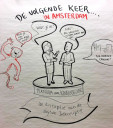
The BIM Loket is organizing a Dialogue Table on the theme of Smart Cities and the disruptive effect of digitization in construction on 16 February. For this meeting, we also invited the Baanbrekers, a transition network in the construction industry. We are guests at Gemeente Amsterdam Ingenieursbureau. Cross-thinkers, creatives and innovators are cordially invited to join! Participation is free. Event in Dutch!
Smart cities and digitization: opportunities from disruption
Large cities in the Netherlands are confronted with global issues such as urbanization, climate change, labor participation, digitization, mobility and the depletion of raw materials. The pressure on cities to find solutions for these major shifts is increasing rapidly. In January last year, 140 stakeholders presented a joint vision on the direction of smart cities in the Netherlands. The City of Amsterdam fulfills a role as a driver of innovation in the city and in the region. What challenges does she face? Amsterdam can not do this alone!
In addition, the developments in - and especially outside - the construction sector are not standing still. The realization of smart cities is partly dependent on digitization and computerization, including Building Information Management (BIM) and the asset management of the future. Which developments are playing here, including internationally? There are signs of disruption in construction, comparable to Uber and Airbnb, for example by parties such as Google, Amazon and IKEA. What opportunities does this offer and how can we respond to this in concrete terms? How can smart cities increase the urgency of this?
More information:
http://www.bimloket.nl/smart-cities-en-digitalisering-doe-mee-met-de-bim-loket-dialoogtafel-op-16-februari
Program and registration (13:15 - 17:15, Stadstimmertuin Amsterdam)
https://dialoogtafel-smartcities.eventbrite.nl
Upcoming event on February 1st
One month to go before our annual free event, Green IT Leaders Live event, on February 1st.
Are you interesting in exploring how groundbreaking technologies are connected to the digital transformation a city? Are you familiar with circular datacenters? Are you a policy-maker? Do wish to learn more about smart infrastructure? Are you dying to know what are the latest trends in ICT?
If you have answered 'yes' to the previous questions, please register yourself with the link below:
https://amsterdamsmartcity.com/events/green-it-weeks-leaders-live-2017
Hope to see there !
Kind regards,
Julie Chenadec
Smart cities and intelligent destinations: Connecting PERU with the World
Developing a "Digital Economy"
In order to accelerate the development of Smart Cities in Peru we will start a series of "interactive" talks with Smart City experts from other countries such as The Netherlands, Spain and Malaysia.
Gradually we will invite experts from other parts of the world to share their experiences and start collaborative processes between Central, Regional and Municipal Governments of all participating countries.
Are you an expert in Smart City? Do you want to collaborate on Projects related to INTELLIGENT CITIES? Are you committed to the development of a Digital Economy in Peru and the World? Please, send us an email to pticoalu@netstairs.com or emesones@peruconnect.net we are interested in connecting with you
PERÚ Connect, 1st Interactive Digital Business Platform.
EUR 2 million prize for a Big Data forecasting system that will enable more efficient use of energy resources and other sustainable outcomes
The European Commission has launched a new Horizon Prize on Big Data Technologies. EUR 2 million is available for improving electricity grid traffic forecasting in terms of scalability, accuracy, speed and use of computational resources.
NYC Launches Electric Vehicles Tech Challenge
Mayor Bill de Blasio and the City of New York are committed to leading in the charge against climate change. In service of that mission, on Monday we announced the latest in our NYCx Moonshot Challenges. As part of a partnership with the City of Paris, we’re launching NYC’s Moonshot Climate Action Challenge to fast-forward to a future where we replace all gas-powered vehicles in NYC! Whether you’re an entrepreneur, researcher, technologist, executive, or just someone with a good idea, I’m inviting you to participate in this challenge and be part of shaping that future. Here are the details:
Challenge participants will submit proposals for 1 or both of 2 tech categories:
Emerging technologies for charging EVs: self-charging streets, inductive/wireless charging, 350+ kW charging, connected vehicle solutions, vehicle-to-grid tech, etc.
Immediately commercializable EV charging tech: 25-150 kW charging, solar parking canopies with integrated EV charging, etc.
Up to 3 finalists from Track 1 will be awarded $20,000 each to demo their technology to the NYC Department of Transportation & Mayor’s Office of Sustainability. Up to 3 finalists from Track 2 will be able to pitch their business plan to the NYC Department of Transportation.
Only 1 winner from each track will be eligible for:
Track 1: full feature at an upcoming global NYCx event
Track 2: $20,000 to further research and develop/expand their proposal and present a live demo that brings that proposal to life (e.g. virtual reality demo, charging demo, city-scale mock-up with adoption scenarios), with a chance to have design elements of their submission included in the City’s EV charging roadmap (currently in development)
Interested? Send us your ideas by Monday 1/15/2018 5PM ET for a chance to make NYC the global leader in climate action: http://www.nyc.gov/html/nycx/climate/climateactionchallenge.html
Have questions? Reach out to Nycx@cto.nyc.gov.
NYCx
Stay up to date
Get notified about new updates, opportunities or events that match your interests.

